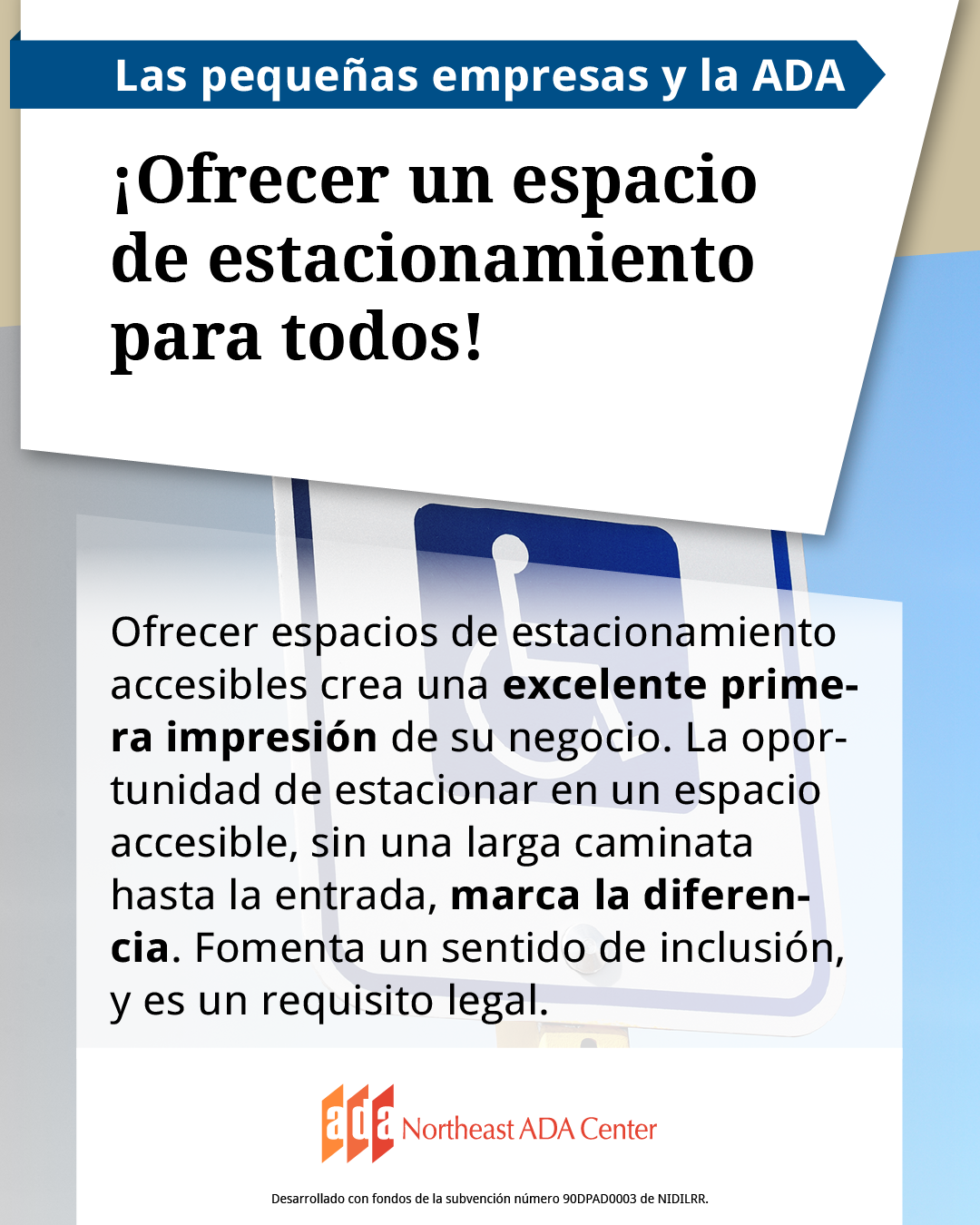Artículos
-
Un Historial de Discriminación y la Ley para Estadounidenses con Discapacidad
Los Estados Unidos tienen leyes que prohíben muchas formas de discriminación, incluyendo la discriminación contra las personas con discapacidad. Este artículo explica por qué estas leyes son important... -
¿Quién está Protegido por la Ley ADA?
La Ley para Estadounidenses con Discapacidades (ADA, por sus siglas en inglés) en general define la discapacidad, incluyendo muchas discapacidades físicas y mentales, también pasadas discapacidades e... -
Cómo Presentar una Queja
Si usted siente que la Ley ADA, o un estatuto relacionado, no está siendo cumplida, puede presentar una queja. Este artículo le ayuda a saber dónde reportar el problema. -
Decisión de Olmstead
¿Cuál es la decisión de Olmstead? ¿Cómo se relaciona con el Título II de la ADA? Este artículo presenta la decisión de Olmstead y analiza algunos casos judiciales relacionados en Nueva York, Nueva Jer... -
La Ley ADA y los Estacionamientos
Los estacionamientos accesibles son una característica común en los estacionamientos y una pregunta que recibimos muy frecuentemente en la línea directa del Centro ADA del Noreste.
Pregunte a ADA
- ¿Existen leyes estatales que protejan a las personas con discapacidades?
Sí. Aunque la ley ADA estableció lo mínimo en derechos y protecciones de las personas con discapacidades, los estados pueden ir más allá para proteger los derechos i... - ¿Qué es la Ley ADA?
La Ley para Estadounidenses con Discapacidades (ADA, por sus siglas en inglés) es una ley de derechos civiles que se aprobó en el 1990 y se enmendó en el 2008. Su meta es asegurar... - ¿Puede llamar a ADA?
ADA no es una agencia, organización o proveedor de servicio. ADA es una ley de derechos civiles que prohíbe la discriminación en contra de las personas con discapacidades en todas... - ¿Es anónima la querella de la Ley ADA que presenté en el Departamento de Justicia?
El Departamento de Justicia (DOJ, por sus siglas en inglés) requiere que el querellante presente información personas cuando presenta una querella. Si el DOJ decide no entablar una acci&... - ¿Puede Pagar la ADA?
P: ¿La ADA pagará por cosas como camionetas para sillas de ruedas o un animal de servicio? R: La Ley de Estadounidenses con Discapacidades (ADA) es una ley y no una agencia federal. No...
Infográficas
Webinars
- ADA 101.2 Overview of Title I and Employment
April 26, 2021
Este seminario gratuito en línea es el tercero de la serie ADA 101 del Centro ADA del Noreste. Dirigido para los nuevos en la Ley de Estadounidenses con Discapacidades o para quienes deseen un...
Noticias
- Nueva York se Une a Otros Estados y Aprueba una Ley Contra el Fraude de los Animales de Servicio
January 17, 2018
Recientemente Nueva York se unió a un creciente número de estados que han aprobado leyes destinadas a reducir el abuso de leyes y regulaciones diseñadas para garantizar que las pe... - Jugador de Fútbol Americano Demanda a los Jets de Nueva York por Violación a la Ley ADA
November 20, 2019
Un jugador de defensa de los Jets, Rontez Miles, presentó una demanda en la corte estatal de Nueva Jersey contra la NFL, alegando que sus derechos bajo la Ley de Nueva Jersey contra la Discrimi... - La "Ley Jake" impulsaría que todos los condados en Nueva Jersey construyeran un área de juegos accesible para todos los niños
August 20, 2025
Un proyecto de ley bajo consideración en la asamblea estatal impulsaría que cada condado en Nueva Jersey construyera al menos un área de juegos "inclusiva" que sea accesible para... - Gobierno Federal Llega a Acuerdo en Demanda por la Expulsión de un Niño con Discapacidad de una Escuela
January 15, 2020
Una cadena nacional de centros de cuido diurno ha llegado a un acuerdo en un caso federal que lo acusaba de discriminación por discapacidad. Spring Education, antes conocido como Nobel Learning... - A Medida que se Acercan los Días Festivos, la Última Ola de Casos de la ADA Desafía la Ausencia de Tarjetas de Regalo en Braille (Revisión de la Legislación Nacional)
November 20, 2019
El jueves, 24 de octubre, nos enteramos de que una nueva ola de demandas comenzó a inundar los expedientes de los tribunales federales de Nueva York. Estas demandas se denominan acciones de cla...





